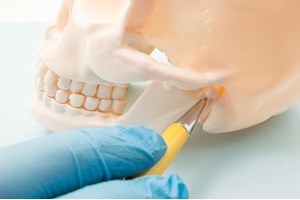Smart headband to stop teeth grinding and jaw clenching
Published: 05/01/2024
A smart textile headband is being developed to stop teeth grinding and jaw clenching – a common and painful condition which affects about a third of adults.
Med-tech startup JawSense has teamed with Nottingham Trent University (NTU) to develop and test the device to treat the condition ‘bruxism’.
There is a lack of treatment options for bruxism, which is characterised by involuntary grinding and clenching of the teeth, can occur while awake and asleep and is often related to stress and anxiety.
It can be difficult to diagnose, and symptoms can include face, neck and shoulder pain, worn-down or broken teeth, headaches and disturbed sleep.
The technology – being developed with almost £1m funding from Innovate UK, part of UK Research and Innovation – will enable people to learn to stop the harmful behaviour, even while they sleep.
There is a significant social and economic burden related to bruxism, which is thought to affect up to 95 per cent of people at some point in their life.
Many cases lead to what is known as temporomandibular disorder (TMD) a condition affecting the movement of the jaw which costs the NHS more than £3bn a year and is the second most common chronic musculoskeletal condition worldwide.
The smart headband with state-of-the-art sensors and machine learning algorithms will be able to accurately detect bruxism episodes and distinguish them from the wearer’s regular jaw activity.
The device will detect jaw tension and deliver gentle vibrations, raising awareness of the behaviour and helping the jaw muscles to relax.
With increased awareness, people are expected to gradually learn to consciously relax their jaws and stop the behaviour.
The headband can be worn anytime and prioritises user comfort and ease of use.
It will be able to diagnose and treat both ‘awake’ and ‘sleep’ bruxism and will work via personalised ‘biofeedback’.
Data will be fed back to a mobile app to track jaw activity and enable data sharing with healthcare practitioners.
The team, including NTU’s Medical Technologies Innovation Facility, has received funding from Innovate UK’s Advancing Precision Medicine programme. The funding will enable the team to optimise and finalise a working prototype and run a phase one clinical trial, after which it is hoped the product will be brought to market.
It is hoped that a phase two clinical trial will then follow, with the aim being NHS procurement.
The researchers argue that, despite promising scientific evidence, there is a gap in the market for using biofeedback devices for treating bruxism.
Bas Borgdorff, CEO of JawSense, said, “By making people aware of their behaviour we can help them to change it.
“The amazing thing is that research shows this learning behaviour can happen while people are asleep as well. This innovation represents a crucial step towards a future where bruxism and TMD can be effectively managed with personalised, non-invasive solutions, significantly improving quality of life and reducing healthcare costs.”
Philippe Wilson, professor of one health at Nottingham Trent University and principal investigator in the Medical Technologies Innovation Facility, said, “This innovation would significantly enhance the lives of millions grappling with the debilitating effects of bruxism and TMD and substantially reduce the financial burden on the NHS and the economy.
“The health service has been grappling with these disorders, which are not only complex to diagnose but also lack licensed treatment which tackles the root cause. This would be a truly effective and data-driven treatment which will have a profound and lasting impact on public health and well-being.”
Author: N/A









.jpg?width=150&height=100&scale=canvas)



